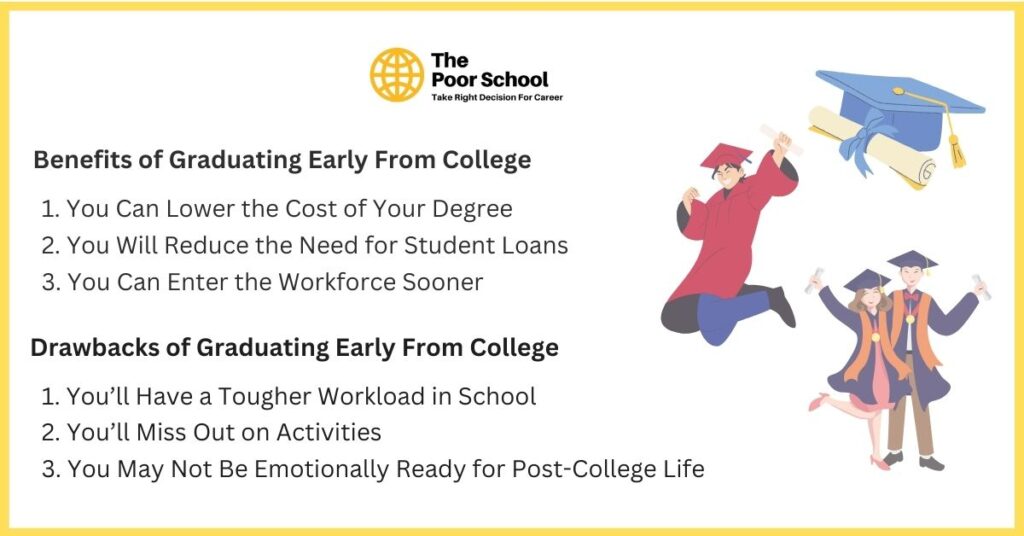Preparing for college? Wondering how long it will take to complete your degree? Don’t worry. I have prepared a comprehensive guide on the number of semesters in college and other academic terms.
Additionally, you will learn about the relationship between semesters, education debts and credits.
What does semester mean
It is the most popular and comfortable academic term among students and universities due to its many features- It divides the academic year into two terms: fall and spring semesters (summer is optional). Students get a break between two terms, which helps them explore various opportunities. In each semester, there are 4 to 5 classes students have to attend.
How many semesters in a year
Each academic year has three semesters: Fall, Spring, and Summer (optional). In most colleges, you will find these three only. Below, we have described each college semester length with the filters.
a. Fall Semester
If you see the fall semester months, it begins at the start of August and ends in December before Christmas. | Duration – 15 weeks |
b. Spring Semester
It begins at the start of January after the new year and Ends in May. Duration – 15 weeks
c. Summer Semester
The summer semester starts in Early June and Ends in July. Duration – 15 weeks
We're here for you.
Summer Break comes under the optional semester for the students to earn extra credits by going with the electives. It will be a good choice, and you will be focused more on core subjects during classes. In the summer semester, you will find very less students, as most of them go on vacations,
Why do US colleges and universities opted semester system?
Each college has a different academic structure. To conduct the curriculum, 90 percent of US universities and colleges opt semester system, As per them. it helps freshmen and other year students to have enough time to acknowledge tough concepts in slow pace.
If we see the duration of semesters in week its about 15 to 16 weeks, which is comparatively more than other academic terms.
Total Semesters in each degree program
- Bachelors – 8 semesters
- Masters – 3 semesters
- PhD – 2 semesters

Pros and Cons of Semester Term
Pro’s
1. More time for each subject and doubt-solving
The semester is 15 weeks long, which helps you get enough time for each class, including solving doubts and having discussions with the professor.
2. Work on Personal Growth and Networking
If you schedule your time properly, you will get much time to explore extracurricular opportunities around the university and join clubs, which thereby help you to develop qualities like leadership and connect with some of the smart people who are managing their academics and passion very well.
3. Go with internships and projects.
One of the best add-ons for resumes, employers always look for students who have worked on projects or internships with reputed companies. If you are admitted to a college with a semester system, you should work on time management to grab this opportunity as early as possible.
Cons
1. Need to spend time in classes – To fulfil the credit requirements, one has to attend the classes that they don’t like, duration of those classes will be 75 minutes.
2. If you are admitted to college with a semester system, my advice is to choose the majors wisely because changing later will hurt your finances and time.
Other Academic Calendars

2. Quarter
This academic term has been popular among students for early completion of graduation. You can find reputed universities with quarter system in California, which includes UCLA and UC Irvine. There are 7 UC, and all Caltechs have a quarter system.
The quarter is divided into four parts: Fall, Winter, Spring and Summer. There is no use case in this term plan, such as optional. One needs to attend all four semesters.
How long is a quarter in college
- Fall quarter – 10 weeks
- Winter quarter – 10 weeks
- Spring quarter – 10 weeks
- Summer quarter – 10 weeks
This academic term has been popular among students for early completion of graduation. You can find reputed universities with quarter system in California, which includes UCLA and UC Irvine. There are 7 UC, and all Caltechs have a quarter system.
The quarter is divided into four parts: Fall, Winter, Spring and Summer. There is no use case in this term plan, such as optional. One needs to attend all four semesters.
Pro's and Cons of Quarter
Pro’s
1. Each term has only three to four classes, which helps students to focus better on each subject, and with fewer subjects, you have to clear a few assignments, which will be best for the students who have fomo of exam.
2. More chances – Due to some reason, your GPA was not good in one of the quarters, as having more classes throughout the year will help you average your GPA.
3. If you don’t like any class and want to get rid of it, I suggest staying calm, as the quarter duration is only ten weeks, so keeping patience for such a short span is not a big deal.
Cons
1. You need to speed up your learning process. In less time, you need to grab more information.
2. Due to the tight schedule, there will be fewer opportunities to join up for internships.
We're here for you.
To see the full list of US Universities and colleges with quarter system Click on Read More
3. Trimester
Trimester is an academic term you cannot easily find in our nation US. I have found one university in California with a trimester system implemented: Golden State University.
You will be amazed that all universities in France have a trimester system that helps students complete graduation early with less burden of education debts. I think it’s a nice initiative.
Trimester is divided into three terms, which include -
- Fall trimester – 12 weeks
- Winter trimester – 12 weeks
- Spring trimester – 12 weeks
Pro and Cons of the Trimester System are the same as the Quarter System. You will not find much difference.
For best readers
Relation Between Semesters and Credits
Credit map down the learning span of the classes, including theoretical and lab classes. For ease of explanation, I am taking an example.
In a four-year program, there are eight semesters, and you need to have at least 120 credits to get the graduation degree, which means,
Each semester, you must have at least 15 Credits, which are further divided into 5 or 6 classes you will learn each semester.
” One class is equivalent to 2 or 3 credits.”
Relation between Semesters and Education Debts
Most students take 4 to 6 years to become a graduate. If you are considering graduating earlier, you can take advantage of the summer semester, where you can go with the electives,
But graduating earlier is a tough job; you need to make preparations before getting into it – Develop time management attributes in your lifestyle, become a quick learner and, most important, an action plan to follow for early graduation.
Early graduation has an inverse relationship with debts. If you graduate early, you will have less debts to pay, which also makes a strong remark on your resume.
With the advantages of early graduation, there are also disadvantages. For your help, I have prepared infographics that illustrate you better, and if you want a dedicated article on student finances, you can comment below.

I have done my best to know you regarding How many semesters in a year. Additionally, if you have any doubts or suggestions related to the article, you can comment or email me. I love engaging readers, as it motivates me to work more.

About the author ....
Hi, I’m Erie Wilson “Think Tank” of this blog. Sharing knowledge related to career decisions since 2020, If you have any doubts related to choosing majors or searching for colleges, you are free to ask in the comments or send me an email.

